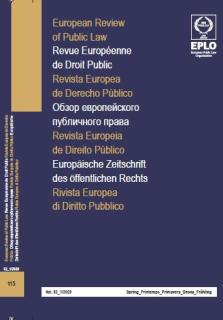
Constitutionalisation and Deconstitutionalisation of Administrative Law
in view of Europeanisation and Emancipation
Prof. Dr. iur. The author holds a chair for Public Law,
European Law and Public Economic Law at the University of Augsburg (Germany)
Constitutionalisation constitutes a common phenomenon of European administrative legal orders, and also EU administrative law is increasingly influenced by its constitutional framework, notably after the entry into force of the EU Charter of Fundamental Rights explicitly guaranteeing a right to good administration. With reference to German administrative law, probably the most constitutionalised administrative law system, culminating in Fritz Werner’s understanding of ‘Verwaltungsrecht als konkretisiertes Verfassungsrecht’ (‘administrative law as concretised constitutional law’), the article in a first step not only elaborates on the phenomenon of constitutionalisation, but also qualifies the widespread constitutionalisation thesis. The latter has moreover been questioned by two megatrends impacting all European administrative legal orders, namely their Europeanisation and their alleged emancipation from the Constitution. Whether this means a deconstitutionalisation of administrative law and how these tendencies might be reconciled, is discussed in further parts of the article. The insights generated by notably using the example of German administrative law are of pan-European relevance and might serve as an analytical tool from a comparative perspective and in view of the further development of EU administrative law.
La constitutionnalisation est un phénomène commun aux ordres juridiques administratifs européens, et le droit administratif de l’UE est lui aussi de plus en plus influencé par son cadre constitutionnel, notamment depuis l’entrée en vigueur de la Charte des droits fondamentaux de l’UE, qui garantit explicitement un droit à la bonne administration. En ce qui concerne le droit administratif allemand – qui est probablement le système de droit administratif le plus constitutionnalisé, une réalité dont le point culminant est la vision du ‹Verwaltungsrecht als konkretisiertes Verfassungsrecht› par Fritz Werner (‹le droit administratif en tant que droit constitutionnel concrétisé›) – l’article ne se contente pas, dans un premier temps, de préciser le phénomène de la constitutionnalisation, mais explique également la thèse de la constitutionnalisation, largement répandue. Cette dernière a d’ailleurs été remise en cause par deux grandes tendances qui touchent tous les ordres juridiques administratifs européens, à savoir leur européanisation et leur prétendue émancipation de la Constitution. La question de savoir si cela signifie une déconstitutionnalisation du droit administratif et comment ces tendances pourraient être conciliées est examinée dans d’autres parties de l’article. Les réflexions générées par l’utilisation de l’exemple du droit administratif allemand ont une portée européenne et pourraient servir d’outil analytique dans une perspective comparative et en vue du développement du droit administratif de l’UE.
* This article has been originally published in the Review of European Administrative Law (REALaw) 10 (2017), issue 1, p. 7 ff. That article is based on the author’s lecture at the 75th annual conference of the Vereinigung der deutschen Staatsrechtslehrer, published under the title ‘Verfassung im Allgemeinen Verwaltungsrecht: Bedeutungsverlust durch Europäisierung und Emanzipation’ in VVDStRL [2016/75] 187–264. Further references may be found there. In view of the English-speaking readership and limited space, original quotations in German have been translated into English without presenting the original quotation; the latter may be found in the aforementioned article.





















